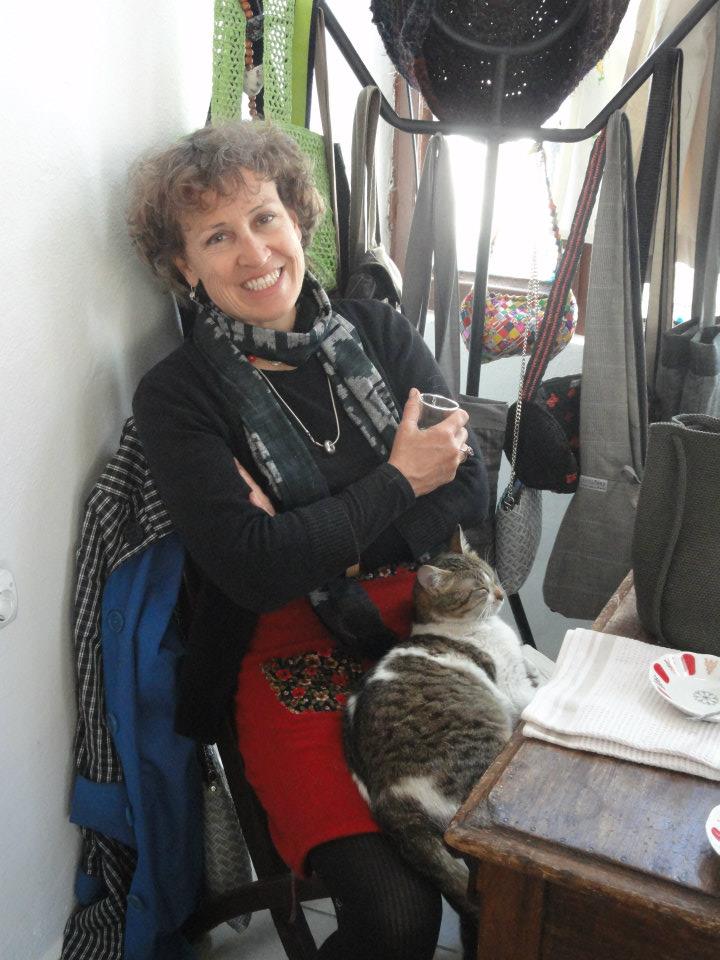 W4 interviews social entrepreneur, Tara Hopkins, Co-Founder of çöp(m)adam, a community project that hires local women in Western Turkey to produce fashionable handbags from discarded trash in an effort to both reduce waste and provide the women with a reliable income.
W4 interviews social entrepreneur, Tara Hopkins, Co-Founder of çöp(m)adam, a community project that hires local women in Western Turkey to produce fashionable handbags from discarded trash in an effort to both reduce waste and provide the women with a reliable income.
Colors flash as deft fingers push needle and thread in and out of the material, carefully stitching together rings of sparkling squares. A cat named Ajda K, deemed the “matron” of the workshop, drapes herself across the boss’s desk, her pose nonchalant, her curious eyes observing the 50-strong group of women, some quietly absorbed in their task, others laughing and joking, as they skillfully transform small piles of “rubbish” into an array of vibrant, eco-chic handbags. This is business as usual in the busy Ayvalik workshop. And yet business here is anything but usual.
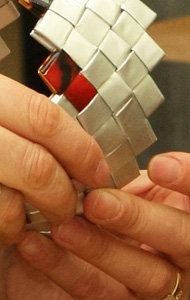 “No, we are not a standard business enterprise, but we sure are having fun in the process of being what we are and what we are becoming”, says çöp(m)adam’s Co-Founder, Tara Hopkins. In 2008, she and a former student, Melih Öszöz, launched çöp(m)adam, an experimental project based in Western Turkey that “takes garbage and turns it into something fashionable and fun”. Its name, “çöp(m)adam” or “garbage (wo)man,” plays on the idea that trash collection is an activity, like so many others, traditionally reserved for men. The project’s aims are twofold: to address the critical problem of waste management in Turkey and to provide employment opportunities for women who have never before received a salary.
“No, we are not a standard business enterprise, but we sure are having fun in the process of being what we are and what we are becoming”, says çöp(m)adam’s Co-Founder, Tara Hopkins. In 2008, she and a former student, Melih Öszöz, launched çöp(m)adam, an experimental project based in Western Turkey that “takes garbage and turns it into something fashionable and fun”. Its name, “çöp(m)adam” or “garbage (wo)man,” plays on the idea that trash collection is an activity, like so many others, traditionally reserved for men. The project’s aims are twofold: to address the critical problem of waste management in Turkey and to provide employment opportunities for women who have never before received a salary.
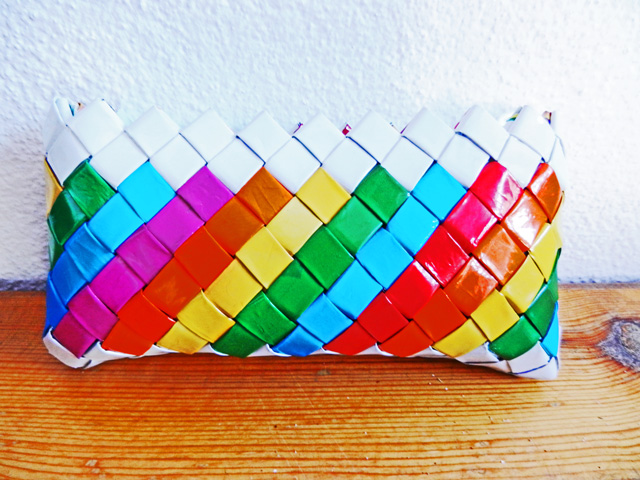 In a recent interview with W4, Tara explained that in Istanbul alone, 10,000 tons of waste are produced every day. Only 18% of this refuse is recycled, and the rest goes directly to landfill. In a world characterized by excess and plagued by waste and pollution, çöp(m)adam aims to demonstrate that there is an alternative. Partnering with Unilever Turkey, çöp(m)adam’s “garbage ladies” transform Unilever’s discarded plastic packaging into a range of high-quality, glamorous bags, which they later sell in shopping outlets throughout Turkey and in city centers abroad as well as online. çöp(m)adam uses revenues from sales to cover its overhead costs and to fund employees’ wages while ploughing all profits back into the business.
In a recent interview with W4, Tara explained that in Istanbul alone, 10,000 tons of waste are produced every day. Only 18% of this refuse is recycled, and the rest goes directly to landfill. In a world characterized by excess and plagued by waste and pollution, çöp(m)adam aims to demonstrate that there is an alternative. Partnering with Unilever Turkey, çöp(m)adam’s “garbage ladies” transform Unilever’s discarded plastic packaging into a range of high-quality, glamorous bags, which they later sell in shopping outlets throughout Turkey and in city centers abroad as well as online. çöp(m)adam uses revenues from sales to cover its overhead costs and to fund employees’ wages while ploughing all profits back into the business.
Environmental sustainability is a key concern, but it is Tara and Melih’s commitment to transforming women’s lives that clearly underpins çöp(m)adam’s activities. Although Turkey is classed as a fast emerging market, only a quarter of the country’s women work outside of the home. “While there are plenty of women who stay at home due to tradition or pressure from the husband or family, there are many women who stay at home because that is where they are most comfortable,” Tara points out. “Our aim is to offer opportunities to women who have not seen their role as anything other than a mother and a wife.”
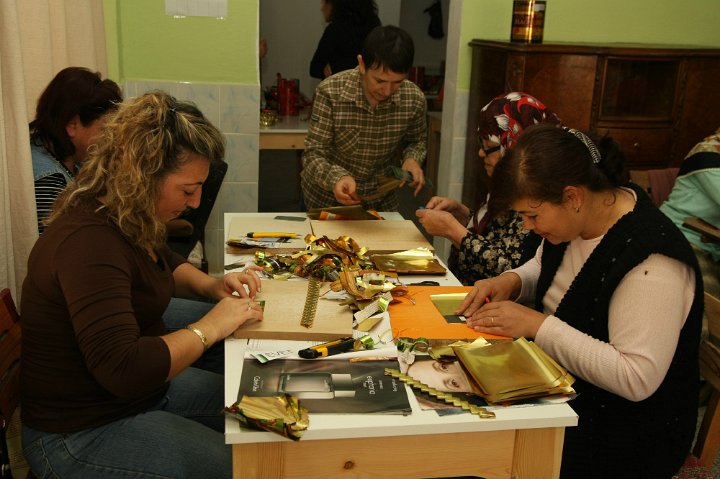 A joint report released by the World Bank and the Turkish government has argued that increased female labor force participation would yield significant economic dividends for the country. However, for Tara, the impact of paid employment for women cannot be measured in economic terms alone. “It’s not just about earning money, it’s about self-confidence,” she explains. “It takes a lot of courage to initially cross the threshold of our workshop, […] to tell your husband that, yes, after all these years you will work outside the home. We don’t believe that we help our ladies as much as we believe we provide them with a venue to develop and grow.”
A joint report released by the World Bank and the Turkish government has argued that increased female labor force participation would yield significant economic dividends for the country. However, for Tara, the impact of paid employment for women cannot be measured in economic terms alone. “It’s not just about earning money, it’s about self-confidence,” she explains. “It takes a lot of courage to initially cross the threshold of our workshop, […] to tell your husband that, yes, after all these years you will work outside the home. We don’t believe that we help our ladies as much as we believe we provide them with a venue to develop and grow.”
Each woman is paid a meaningful wage for her work (on a per item basis) and each product is sent to market accompanied by a short note that includes the name of the woman who fabricated it and also describes çöp(m)adam’s philosophy.
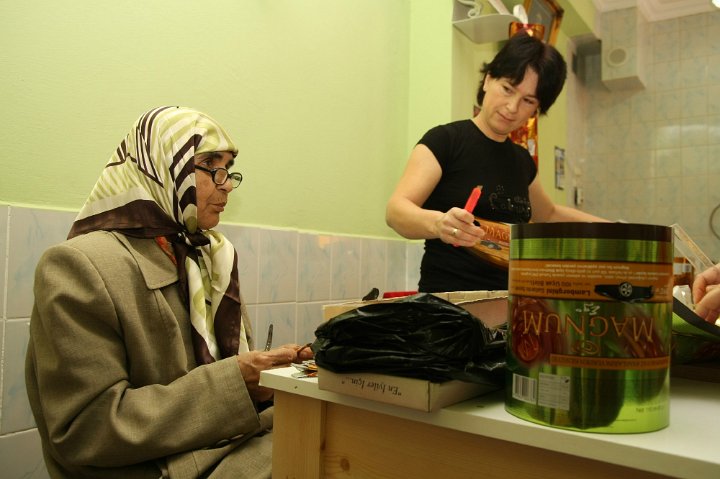 When asked how she measures the social impact of çöp(m)adam’s work, Tara laughs: “This is the most difficult question of all! I would love to see the questionnaire that asks if anyone has purchased a swimsuit for the first time as an indicator of increased self-esteem.” Tara recognizes that the most significant fruits of çöp(m)adam’s labor are largely unquantifiable, certainly by existing yardsticks. “The way [our women] hold their heads up, the way they carry themselves, the way they voice their opinions […] The fact that our ladies will take themselves out to breakfast and spend money on themselves […] are indicators that do not fit on prescriptive impact assessment forms.”
When asked how she measures the social impact of çöp(m)adam’s work, Tara laughs: “This is the most difficult question of all! I would love to see the questionnaire that asks if anyone has purchased a swimsuit for the first time as an indicator of increased self-esteem.” Tara recognizes that the most significant fruits of çöp(m)adam’s labor are largely unquantifiable, certainly by existing yardsticks. “The way [our women] hold their heads up, the way they carry themselves, the way they voice their opinions […] The fact that our ladies will take themselves out to breakfast and spend money on themselves […] are indicators that do not fit on prescriptive impact assessment forms.”
Tara’s comments reflect some of the difficulties that social enterprises commonly face, particularly in Turkey, where the concept is still very new. Many countries around the world have made legal and tax code provisions for social businesses, but the law in Turkey does not yet recognize social enterprise (that is, income-generating, non-profit enterprise) as legitimate. çöp(m)adam started out as an experimental project with very little start-up capital, but quickly developed and today is registered as a company, subject to taxes and legal obligations. “When we talk about our business model,” says Tara, “people tend to ask ‘How much profit do you make?’ In general, civil society in Turkey is still very weak, so we cannot expect social enterprise to be abundant yet. While there is little culture for such endeavors, there are also many obstacles to taking our work forward.”
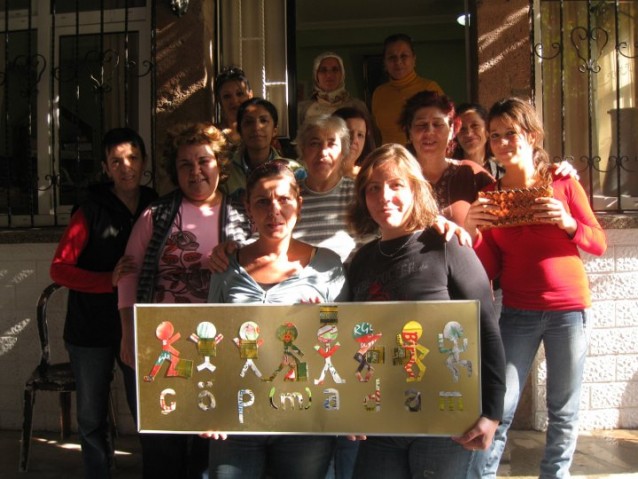 Nonetheless, Tara, a passionate believer in empowerment from the grass-roots level, believes that çöp(m)adam is a shining example of a sustainable social business that is making a tangible difference in the local community and could serve as a model for others to replicate. She is not alone in her optimism. In 2011, UNDP selected çöp(m)adam as one of the top six social entrepreneurial projects in Turkey, naming it as one of the “best practices” for emerging markets. The future is certainly bright for the garbage ladies. This summer, the Open Society Institute Assistance Foundation approached çöp(m)adam to collaborate with a poverty-eradication program in Moldova, allowing the garbage ladies to share their expertise with a group of disabled girls and their mothers. After a week’s training, these women returned to Moldova ready to put their new skills to good use in a different context, empowering a new generation of garbage ladies.
Nonetheless, Tara, a passionate believer in empowerment from the grass-roots level, believes that çöp(m)adam is a shining example of a sustainable social business that is making a tangible difference in the local community and could serve as a model for others to replicate. She is not alone in her optimism. In 2011, UNDP selected çöp(m)adam as one of the top six social entrepreneurial projects in Turkey, naming it as one of the “best practices” for emerging markets. The future is certainly bright for the garbage ladies. This summer, the Open Society Institute Assistance Foundation approached çöp(m)adam to collaborate with a poverty-eradication program in Moldova, allowing the garbage ladies to share their expertise with a group of disabled girls and their mothers. After a week’s training, these women returned to Moldova ready to put their new skills to good use in a different context, empowering a new generation of garbage ladies.
Since its launch, çöp(m)adam has opened two new workshops and worked with a total of 500 women. More than 20 tons of Unilever waste have been recycled and over 9000 bags have been produced, 8000 of which have already been sold.
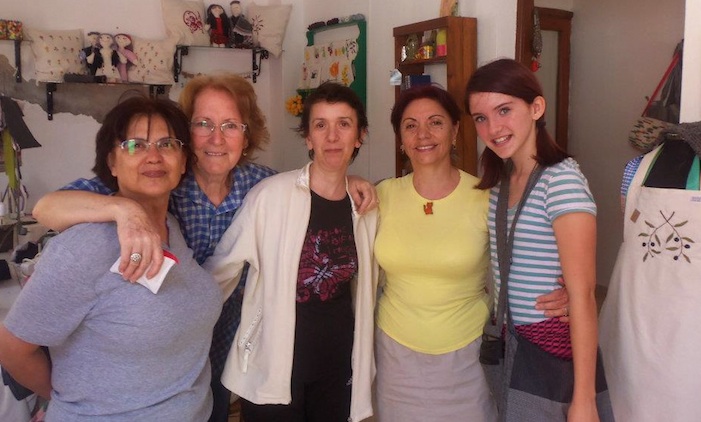 But it is not about the volume, Melih and Tara stress. It is about changing mindsets and creating awareness that women can use traditional skills in innovative ways, without wrecking the status quo. “We are careful to work within societal norms so as not to rock the boat too much,” insists Tara, “and [we] let those who want to grow do so as they wish, not as we think they should.”
But it is not about the volume, Melih and Tara stress. It is about changing mindsets and creating awareness that women can use traditional skills in innovative ways, without wrecking the status quo. “We are careful to work within societal norms so as not to rock the boat too much,” insists Tara, “and [we] let those who want to grow do so as they wish, not as we think they should.”
“And how can readers support your work?” we ask. Tara’s response is simple: “Buy our products – not out of charity, but because you really like the item!”
 For a full range of the one-of-a-kind bags on offer, we invite you to have a look at the çöp(m)adam online gallery.
For a full range of the one-of-a-kind bags on offer, we invite you to have a look at the çöp(m)adam online gallery.
© Women’s WorldWide Web 2013













